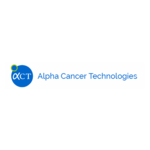
Alpha Cancer Technologies (ACT) Publishes Pre-Clinical Study Results in Cancer Cell International Demonstrating Excellent Safety and Significant Anti-Tumor Activity from the Company’s Next Generation ADC, ACT-903
ACT-903 conjugate demonstrated significant anti-tumor activity, with tumors becoming undetectable in 9 of 10 mice, and all 10 mice surviving through Day 60 with no obvious signs of toxicity
ACT’s technology highlights the potential to use the natural function of AFP as a carrier protein to deliver a payload uniquely targeted to cancer cells, while reducing risk of immune reactions or anti-drug antibody accumulation
Alpha fetoprotein conjugates had a very low percentage of free toxin detectable in blood after administration, and did not show any bone marrow accumulation of cytotoxic payload, suggesting limited off-target toxicity
TORONTO--(BUSINESS WIRE)--#ACT903--Alpha Cancer Technologies Inc. (ACT), a biopharmaceutical company focused on developing and commercializing targeted immuno-oncology and immunomodulation therapies based on its proprietary recombinant human Alpha Fetoprotein (AFP) platform, today announced the publication of pre-clinical study results in Cancer Cell International highlighting the company’s recombinant human AFP (ACT-101) conjugate with maytansine in mouse xenograft models of colorectal cancer. Results from the study demonstrate the exceptional safety profile and potent anti-tumor activity of multiple ACT-101 conjugates through the successful targeting of the alpha fetoprotein receptor uniquely located on cancerous cells and myeloid-derived suppressor cells (MDSCs).

The AFP receptor has been found on the surface of cancer cells and MDSCs exclusively, making it an attractive target for the delivery of toxins selectively to tumor cells and MDSCs. Human AFP acts as a shuttle protein, transporting a variety of molecules including targeted anti-cancer agents inside the cell via the AFP receptor. ACT-101 is a recombinantly produced non-glycosylated form of human AFP, which will carry and deliver maytansine and other chemotherapy payloads to tumor cells via the AFP receptor. The selection of maytansine was based on its prior efficacy in clinical studies when incorporated into ADCs.
The AFP receptor has emerged as a novel target for cancer therapeutics given the expression of AFP on most cancers and MDSCs, and lack of presence on normal tissues. Studies were performed to investigate the use of ACT-101 conjugated with maytansine for targeted toxin delivery to cancer. Four structurally different ACT-101-maytansinoid conjugates containing cleavable glutathione sensitive linkers were initially investigated in a mouse xenograft model of colorectal cancer (COLO-205). Reduction in tumor volume was seen for all four conjugates compared to control (p < 0.05). The anti-tumor effects of the conjugate selected for further development, ACT-903, persisted after treatment discontinuation, with tumors becoming undetectable in 9 of 10 mice, and all 10 mice surviving through Day 60 with no obvious signs of toxicity. A follow-up study performed in the same model compared the effects of single intravenous doses of ACT-903 (10–50 mg/kg) to control groups receiving vehicle or ACT-101. A significant reduction of tumor burden compared to control was achieved in the 40 and 50 mg/kg dose groups. Survival was also significantly prolonged in the 40 mg/kg and 50 mg/kg cohorts. Free maytansine blood levels at 4 hours were 0.008% of the dose, indicating stability in circulation as was expected based on in vitro plasma stability studies. No obvious signs of toxicity were seen in any of the treated groups. The observed efficacy and excellent tolerability of ACT-903 in these xenograft models support advancing the development of ACT-903 into clinical studies.
“Based on the evidence we continue to observe in our pre-clinical studies, we believe ACT-903 has the potential to address the limitations of current-generation antibody drug conjugates through a targeted delivery exclusively to cancer and immune suppressor cells, allowing for greater efficacy with minimal toxicity,” said Dr. Igor Sherman, CEO of ACT. “Given the broad range of cancer cells expressing the AFP receptor, we believe our technology offers a potential pan-cancer opportunity and we look forward to continuing the development of this program to bring it to cancer patients in the shortest possible time.”
The manuscript, titled “High anti-tumor activity of a novel alpha-fetoprotein-maytansinoid conjugate targeting alpha-fetoprotein receptors in colorectal cancer xenograft model,” was published in Cancer Cell International on April 5, 2023 and the full manuscript can be accessed here.
About Alpha Cancer Technologies, Inc.
Alpha Cancer Technologies Inc., (ACT) is a private clinical stage biotechnology company with immuno-oncology, theranostics and immunomodulation platforms under development. The company’s drug products use ACT’s patented recombinant human alpha fetoprotein (AFP or ACT-101). ACT’s immuno-oncology products target AFP receptors uniquely expressed on almost all solid and liquid tumors and immune suppressor cells but are absent on normal cells. This approach utilizes next-generation ADC technology and offers the benefits of much lower toxicity and greater efficacy compared to conventional chemotherapy and other targeted therapies. ACT is based in Toronto, Ontario, Canada. For more information, please visit www.alpha-cancer.com
Contacts
Richard Potts, Chair
Alpha Cancer Technologies Inc.
Tel: +1 (416) 464-2678
Email: rpotts@alpha-cancer.com
Igor Sherman, Ph. D., President & CEO
Alpha Cancer Technologies Inc.
Tel: +1 (416) 826-6626
Email: isherman@alpha-cancer.com
For investors, please contact:
Stephen Jasper
Gilmartin Group
Tel: +1 (858) 525-2047
Email: stephen@gilmartinir.com
Editor Details
-
Company:
- Businesswire
